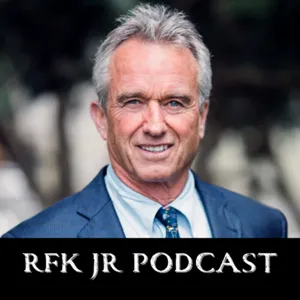Podcast Summary
European investigation into AstraZeneca clots prompts J&J vaccine pause: Regulators are investigating rare cases of blood clots with COVID-19 vaccines, leading to a pause in use of Johnson and Johnson's vaccine, emphasizing the importance of ongoing safety monitoring.
The US decision to pause the use of Johnson and Johnson's COVID-19 vaccine was prompted by European regulators' investigation into rare cases of blood clots associated with the AstraZeneca vaccine. These clots were unusual due to their location in the brain and low levels of platelets. European regulators began to suspect a rare and serious condition, and when investigating similarities with the Johnson and Johnson vaccine, they found six reports of similar cases in the US. While the number of cases is small, both European and US regulators are taking a cautious approach to ensure public safety. This incident highlights the importance of ongoing monitoring and investigation of vaccine safety.
Regulators weigh benefits and risks of J&J vaccine and blood clots: Regulators chose to pause J&J vaccine due to rare blood clots to allow for further investigation and communication with healthcare providers and the public.
When dealing with potential health risks associated with vaccines, regulatory bodies must carefully weigh the benefits and risks, and consider the availability of adequate information and treatment options. In the case of the Johnson & Johnson COVID-19 vaccine and reports of rare blood clots, US regulators faced a decision between issuing a warning or recommending a pause in vaccinations. While a warning might have been less disruptive, concerns over the potential misdiagnosis and mistreatment of blood clots, as well as the possibility of more undisclosed cases, led officials to choose a pause. This decision, announced at a press conference, was described as an abundance of caution, and the regulators emphasized the rarity of the events. Ultimately, the pause allowed for further investigation and communication with healthcare providers and the public to ensure the best possible response to this complex situation.
Johnson & Johnson Vaccine Pause Leads to Nationwide Halts: The US health regulators' pause of the Johnson & Johnson COVID-19 vaccine caused cancellations, paused campaigns, and logistical challenges in delivering 100 million doses by the end of May.
The US health regulators' recommendation to pause the use of the Johnson & Johnson COVID-19 vaccine led to a nationwide halt of its administration within a few days. This pause was a response to rare but serious side effects reported in some recipients. The immediate consequences include cancellations of appointments, paused vaccination campaigns, and uncertainty about the timeline for returning to normalcy. Johnson & Johnson was a crucial component of the Biden administration's plans to deliver 100 million doses by the end of May. The pause, especially in areas where other vaccines are not easily administered due to their storage requirements, adds to the logistical challenges and scheduling uncertainties.
Johnson & Johnson vaccine's advantages for rural areas and homebound individuals: The Johnson & Johnson vaccine's convenience and ease of administration, particularly in rural areas and for homebound individuals, make it an attractive option. However, recent reports of rare blood clots may increase hesitancy, and clear communication from the government about the vaccine's safety is crucial to maintain public trust.
The Johnson & Johnson vaccine offers convenience and ease of administration, particularly in rural areas where facilities for storing frozen vaccines may not be available. This is a significant advantage for homebound individuals who cannot travel to clinics. Additionally, the single-dose requirement is appealing to many people. However, the recent pause in the use of the Johnson & Johnson vaccine due to reports of rare blood clots may increase hesitancy in some demographics, particularly those already skeptical of COVID-19 vaccines. The government's handling of the messaging surrounding the safety of the vaccine and the rarity of the reported condition will be crucial in mitigating any potential concerns. The US government's role is to ensure the public understands the incredibly low risk of experiencing these conditions compared to the risks of contracting COVID-19. The government's messaging will be a key factor in maintaining public trust and confidence in the vaccine.
Pause in Johnson & Johnson Vaccine Distribution and Its Global Implications: A pause in Johnson & Johnson vaccine distribution in the US and potential delays in authorization in other countries could impact COVAX distribution to less affluent nations and healthcare workers' plans. The pause is due to reports of rare blood clots in six women, and regulators are assessing the vaccine's risks and benefits.
The pause in the distribution of the Johnson & Johnson COVID-19 vaccine in the US and potential delays in its authorization in other countries could have significant global implications. The vaccine was set to be distributed through COVAX to countries that cannot afford to purchase vaccines on their own, and countries like South Africa had planned to use it for their healthcare workers. The pause, which may last a few days, comes after reports of rare but serious blood clots in six women who received the vaccine. The FDA and CDC are currently reviewing new reports and data to determine if the vaccine's benefits outweigh the risks and if there should be any restrictions on who can receive it. It's important to note that pauses in vaccine distribution are not uncommon in the world of drug development, and they typically end with adjustments and guidelines to minimize risks. If you have recently received the Johnson & Johnson vaccine, it's important to remember that the condition appears to be rare and may not be related to the vaccine. Monitor your health closely and stay informed about any updates from the FDA and CDC.
Vaccine side effects and military withdrawal: Contact your doctor if you experience severe symptoms after getting the Johnson & Johnson COVID-19 vaccine. President Biden announced the withdrawal of all American troops from Afghanistan by September 11th.
If you receive the Johnson & Johnson COVID-19 vaccine and experience severe symptoms such as a headache or leg pain within three weeks, it's important to contact your doctor and inform them of your vaccination. Although the likelihood of experiencing these issues is low, it's crucial to prioritize your health. Meanwhile, President Biden announced the withdrawal of all American troops from Afghanistan by September 11th, marking the end of America's longest war. In other news, the medical examiner in the George Floyd case testified that Floyd's heart condition, drug use, and carbon monoxide exposure contributed to his death, while the officer who shot Daunte Wright will be charged with second-degree manslaughter.






